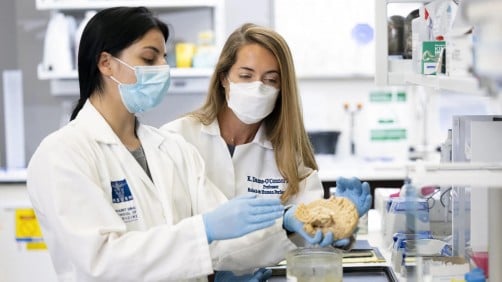Health
Mount Sinai Study Reveals CTE Rare in Isolated Brain Injury Cases

A recent study from the Brain Injury Research Center at Mount Sinai Health System has found that Chronic Traumatic Encephalopathy (CTE) is infrequent among individuals with isolated brain injuries. Published on October 18, 2025, in the *Journal of Neuropathology & Experimental Neurology*, this research highlights the need for a broader understanding of CTE, particularly in populations outside of professional athletes.
CTE is a neurodegenerative disease characterized by the accumulation of tau protein in the brain. It is most commonly associated with individuals who have suffered extensive repetitive head impacts, particularly in contact sports such as American football. The condition has also been identified in individuals exposed to head trauma from various other activities, including military service and domestic violence.
According to Kristen Dams-O’Connor, PhD, Director of the Brain Injury Research Center and senior author of the study, “Most prior CTE studies have been conducted in selected samples of male American football players. We know little about the frequency of the disease in individuals with different types of head trauma exposure.”
The researchers analyzed postmortem brain tissue from 47 donors as part of the Late Effects of Traumatic Brain Injury Project, which ran from 2018 to 2024. This project involves a prospective study of over 500 individuals living with traumatic brain injury (TBI), alongside those who have donated their brains for research after death. The team compiled comprehensive trauma histories through medical records, autopsy reports, and structured family interviews.
Key Findings on CTE and Brain Trauma
The investigation confirmed CTE in seven of the 47 decedents. Six of these donors had histories of extensive repetitive head impacts, while one case had experienced two severe isolated TBIs without a known history of repetitive impacts. The researchers employed advanced neuropathologic methods, including tau immunohistochemistry and postmortem MRI scanning, to identify subtle brain changes that may contribute to the development of CTE.
Enna Selmanovic, a PhD candidate at the Icahn School of Medicine and the first author of the paper, noted, “As one of the first systematic autopsy investigations of CTE in a cohort of donors with varied types of head trauma histories, this study adds to our understanding of how common or rare CTE really is.”
While the study reinforces the link between extensive repetitive head impacts and CTE, it also emphasizes the importance of distinguishing between various types of head trauma and their associated risks. The research team aims to clarify frequently misunderstood terminology pertaining to brain injuries, which often leads to public confusion.
They defined key concepts as follows:
– **Traumatic Brain Injury (TBI)**: A blow to the head resulting in loss or alteration of consciousness or acute symptoms.
– **Blow to the Head**: An isolated injury that does not meet TBI diagnostic criteria.
– **Repetitive Head Impacts**: A series of impacts sustained in close succession that may or may not result in acute TBI symptoms.
– **Extensive Repetitive Head Impacts**: Exposure over five or more years.
Importance of Community-Based Research
Dams-O’Connor stressed that community-based research is essential for understanding CTE beyond the narrow focus on professional athletes. “We can’t limit our studies to highly symptomatic donors if we want to figure this out,” she said. The research underscores a vital need for comprehensive studies involving diverse populations to better assess risk factors and protective measures against CTE.
The findings from this study contribute significantly to the ongoing discourse surrounding brain injuries and neurodegenerative diseases, ultimately aiming to reduce fear and misinformation among the public regarding various forms of head trauma.
The Mount Sinai Health System, one of the largest academic medical systems in the New York metropolitan area, continues to lead efforts in addressing complex healthcare challenges. With a commitment to advancing scientific knowledge and improving patient care, Mount Sinai remains dedicated to fostering a deeper understanding of health issues affecting diverse communities.
-

 Science2 weeks ago
Science2 weeks agoIROS 2025 to Showcase Cutting-Edge Robotics Innovations in China
-

 Politics2 weeks ago
Politics2 weeks agoJudge Considers Dismissal of Chelsea Housing Case Citing AI Flaws
-

 World2 weeks ago
World2 weeks agoBravo Company Veterans Honored with Bronze Medals After 56 Years
-

 Top Stories2 weeks ago
Top Stories2 weeks agoIndonesia Suspends 27,000 Bank Accounts in Online Gambling Crackdown
-

 Lifestyle2 weeks ago
Lifestyle2 weeks agoStone Island’s Logo Worn by Extremists Sparks Brand Dilemma
-

 Sports2 weeks ago
Sports2 weeks agoMel Kiper Jr. Reveals Top 25 Prospects for 2026 NFL Draft
-

 Health2 weeks ago
Health2 weeks agoStartup Liberate Bio Secures $31 Million for Next-Gen Therapies
-

 Health2 weeks ago
Health2 weeks agoTop Hyaluronic Acid Serums for Radiant Skin in 2025
-

 World2 weeks ago
World2 weeks agoHoneywell Predicts Record Demand for Business Jets Over Next Decade
-

 Politics2 weeks ago
Politics2 weeks agoNew Jersey Voters Urged to Register Ahead of November Election
-

 Lifestyle2 weeks ago
Lifestyle2 weeks agoMary Morgan Jackson Crowned Little Miss National Peanut Festival 2025
-

 Sports2 weeks ago
Sports2 weeks agoYamamoto’s Mastery Leads Dodgers to 5-1 Victory in NLCS Game 2









